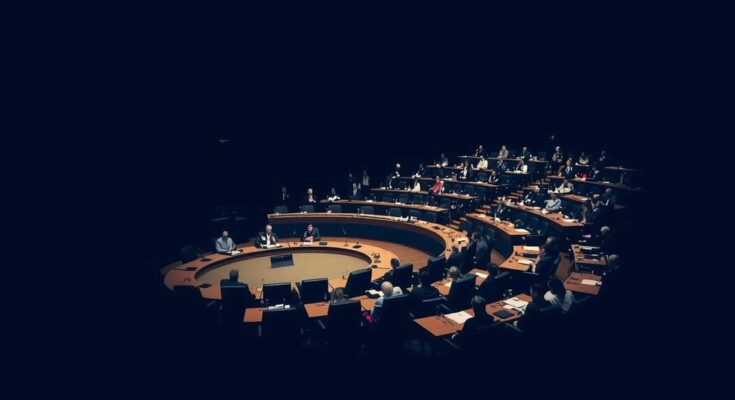On December 5, 2024, the ICJ in The Hague held hearings on the obligations of UN member states regarding climate change. Nations such as the Solomon Islands, India, and Iran argued that developing countries should not face the brunt of climate impacts due to the historical emissions of industrialized nations. They called for enhanced legal frameworks to ensure financial and technological support, highlighting the moral imperative of climate justice.
On December 5, 2024, the International Court of Justice (ICJ) in The Hague conducted hearings focusing on the essential obligations of UN member states regarding climate change mitigation and environmental protection. Participants included representatives from the Solomon Islands, India, and Iran, all emphasizing that developing nations should not shoulder the consequences of the climate crisis primarily caused by advanced economies’ historical emissions.
The Solomon Islands underscored the connection between climate justice and human rights, advocating for immediate global action to assist vulnerable populations facing existential threats due to climate change. Attorney General John Muria expressed the moral and legal imperatives calling for support from developed nations, stating that such aid is necessary, not charitable. Likewise, India highlighted the principle of Common but Differentiated Responsibilities and Respective Capabilities (CBDRRC), arguing that climate action should not compromise developing nations’ growth agendas and poverty alleviation efforts.
Iran reinforced the need for equitable treatment of developing countries in climate action efforts, criticizing external pressures that hinder cooperation and technological transfer essential for effective mitigation strategies. Witnessing the ongoing advocacy from these nations, the ICJ is expected to provide an advisory opinion on state responsibilities concerning climate impacts, focusing particularly on the obligations owed to small island developing states, although the ruling will not be enforceable.
The submissions from these countries collectively assert that historical emissions contributions dictate a differential climate obligation, advocating for urgent financial and technological support from industrialized nations.
The representatives of the Solomon Islands and India appealed for robust legal frameworks to compel developed states to fulfill their financial commitments, particularly the long-promised climate finance of USD 100 billion per year, which has not yet yielded significant benefits to developing counterparts.
This hearing is critical in addressing longstanding inequities in climate action and securing support for nations most impacted by climate change, positioning the ICJ’s upcoming advisory opinion as a potential catalyst for reform in international climate policy.
The discussions at the International Court of Justice (ICJ) highlight the pressing nature of climate change as a global crisis, particularly concerning the responsibilities of developed nations towards developing countries. Historically, industrialized states have been the largest contributors to greenhouse gas emissions; thus, the continuing impacts of climate change disproportionately affect vulnerable populations in developing nations. The legal implications discussed are pivotal, as they frame the ethical obligations that prosperous nations have towards those suffering from the consequences of an ecological crisis primarily stemming from historical factors beyond their control.
The hearings at the ICJ underscore the critical need for an equitable approach to global climate action that recognizes historical emissions and the consequent obligations of developed nations. The testimonies from the Solomon Islands, India, and Iran highlight not only the urgent need for financial and technological support but also emphasize that such assistance should be seen as a legal obligation instead of an act of charity. The Advisory Opinion of the ICJ may serve as a crucial turning point in the international dialogue on climate justice, driving systematic changes to accountability in global environmental policy.
Original Source: www.ipsnews.net




